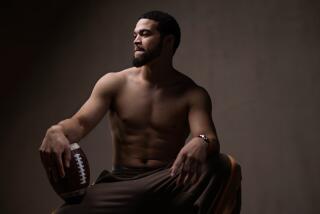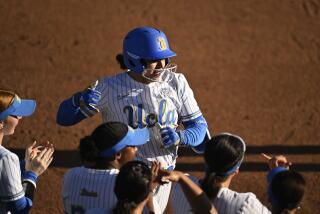She’s a 2-Sport Standout : UCLA: Natalie Williams is a star in basketball and volleyball.
- Share via
After playing four minutes and making one free throw in the first half of an early-season basketball game, the UCLA star went to the locker room and changed uniforms. As the second half of the Bruins’ basketball game continued without her, she warmed up with her volleyball teammates behind a curtain in Pauley Pavilion. Little more than an hour later, the two-time collegiate volleyball player of the year led her team to an important victory in a match with archrival USC. Two sports, one arena in five hours: It was the first time a UCLA athlete had competed in two sports in the same day.
The license plate on Natalie Williams’s red pickup truck reads, “NAT KNOS.” She ordered it last year because she and Bo Jackson share two things: a birthday (Nov. 30) and excellence in two sports. But Williams did something last month that Jackson, for all his exploits, never has done. She competed in both in one day. Even Deion Sanders, who sat on the Atlanta Braves bench during one game of the World Series after playing for the Atlanta Falcons earlier in the day, hasn’t done it.
“It was a stunt, yes,” Williams said the other day, “but it made history too. I don’t know if anyone, man or woman, has ever done it, in any sport, in college. It was neat. But now I know how Bo and Deion feel. I was so tired when it was over.”
This weekend, Williams, playing her senior volleyball season, is leading UCLA in the women’s volleyball final four in Albuquerque. If the undefeated and heavily favored Bruins win, it will be their third consecutive NCAA title. No school ever has won three in a row. Thursday night, No. 1 UCLA reached the finals by beating Florida and now faces No. 2 Stanford for the championship on Saturday night.
Then Williams will fly to Columbus, Ohio, to join her basketball teammates for a Tuesday night game against Ohio State. A 6-foot-1 center-forward with junior eligibility, Williams -- a two-time Pac-10 player of the week and the league leader in rebounding last season -- likely would have been an all-America last season had she not missed too many early-season games. The school is not taking any chances this season.
“Last year, we wanted her to get some games off to rest up after volleyball,” said Judy Holland, UCLA’s senior associate athletic director. “But you have to play in 75% of your team’s basketball games to be considered for all-America honors, and she missed one game too many. We’re taking care of it this year to make sure she has the opportunity.”
Unlike her personal doubleheader last month, this is no stunt. The powerful Williams, daughter of former ABA and NBA player Nate Williams, is the best college women’s volleyball player in the country. She played on the U.S. team at the 1991 Pan American Games in Havana and is planning on playing in the 1996 Olympics in Atlanta.
She is a benevolent terror on the volleyball court. With her size and strength, she is a ferocious spiker, holding the school career record for kills. When a set comes her way, the crowd roars in anticipation. But, once the point is won, the fire in her eyes dissolves into an easy smile.
“No one thinks women can hit this hard,” she said.
If she devoted as much time to basketball as she has to volleyball, she might be just as good. As it is, she enters the season with the school’s highest career rebounding average (12.2 per game), ahead of such standouts as Ann Meyers and Jackie Joyner-Kersee; she’s third all-time in scoring average at 18.2 points per game and she’s fourth in field-goal percentage (53.8%). And she has this season and the next to improve on those numbers because she missed her first year after minor foot surgery.
For Williams, basketball is no hobby. When the Pac-10 all-stars toured Europe last summer, she led the team in scoring and rebounding and so impressed the sponsors of the French national team with a 37-point, 18-rebound night that they offered her $300,000 on the spot to come and play for them.
But, forced to choose, volleyball is the sport she loves.
“Basketball is fun and exciting, but it seems like there are more dimensions in volleyball,” she said. “It’s hard mentally, you have to focus so much and points happen so quickly.” Williams was raised in the most challenging of environments. Her mother and father, who met and dated at Utah State, never married. In fact, when she gave birth to Natalie, Robyn Barker was told by her parents to put her tiny daughter up for adoption.
“My parents said I was going to have lots of trouble raising her here,” Barker said by telephone from Salt Lake City.
Barker is white. Nate Williams is black. But Barker, then 20, kept her daughter. She never married, raising Natalie in Utah’s Mormon church, surrounded by her parents and family. She isn’t certain, but she believes Natalie never knew another black person.
“We were living in a community where there weren’t many black people,” Barker said. “There might have been one or two black kids in Natalie’s high school. She thought of herself as white.”
“To be honest, when I was young, I was afraid of black people,” Williams said. “I didn’t really know I was black. Growing up, I was always taller than everyone; I was 6-1 in sixth grade. I was the class clown, teacher’s pet, an athlete, looked up to by a lot of people. Apparently, my personality helped people see through the color part. I never felt I was different.”
When her daughter was 4, Barker took Williams to a pro game in Salt Lake City to watch her father play.
“We sat where he could see us and although he never talked to us, I know he saw us,” Barker said. “I wanted him to see how beautiful his daughter was.”
When she was about 8, Natalie Williams started to notice she was different from the other children in church and at school. She looked at the palm of her hand and saw it was white. But she noticed the other side was black.
At 16, Williams finally met her father.
“She got a call from him one night,” Barker said. “He had gotten our number from a friend of his in Salt Lake, he had heard about her and he said he wanted to meet her.”
Four months later, Nate Williams drove from his home in Northern California to meet Natalie.
“A friend of mine would call and let me know how Natalie was doing,” said Nate Williams, who now drives an oil tanker in California. “When I finally met her, she had a lot of questions about why I had not been there. I don’t think she understood at first, but, gradually, we became close.”
“He jumped into it like a father. He just loved her and adored her,” said Barker, who gave Natalie her father’s last name to “give her a little piece of her father.”
More to Read
Go beyond the scoreboard
Get the latest on L.A.'s teams in the daily Sports Report newsletter.
You may occasionally receive promotional content from the Los Angeles Times.






